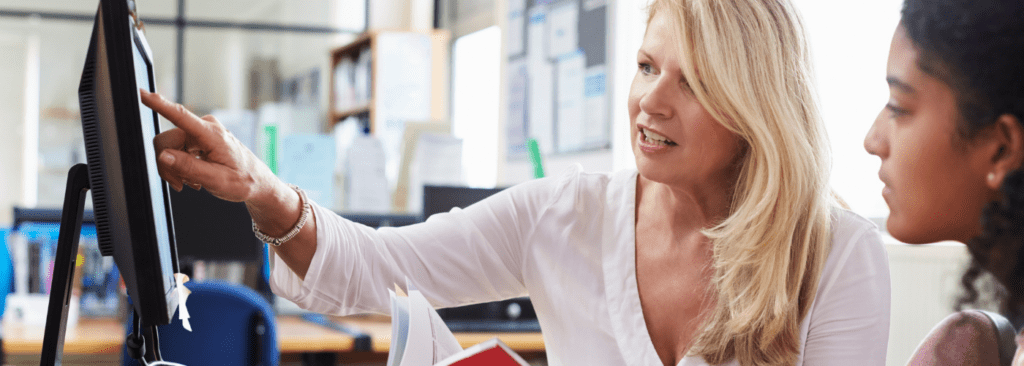Access is More Than Accommodations
Accommodations are provided by a school, employer, or other institution to ensure deaf people are able to fully access all the experiences and activities offered—however, access is more than just the provision of accommodations. True access is about creating an inclusive environment that empowers all individuals to participate meaningfully.
To promote equal opportunities and effective communication, legal frameworks like Section 504 of the Rehabilitation Act and the Americans with Disabilities Act require institutions to provide reasonable accommodations upon request. These laws serve as a foundation for ensuring that accessibility is not just a concept but a practical reality.
Types of Accommodations
Though not an exhaustive list, these are some commonly used accommodations.
Interpreters
Interpreters facilitate communication between a deaf and hearing person. This can be done in a number of modalities identified by the deaf person including:
- ASL interpretation
- Transliteration
- Tactile interpretation
- Oral transliteration
- Cued Speech Transliteration
Speech-to-Text Services
Speech-to-text services (STTS) is an umbrella term used to describe an accommodation where spoken communication, as well as other auditory information, is translated into text in real-time. A service provider types what is heard, and the text appears on a screen for the consumer to read. There are three main types of STTS:
- Communication Access Realtime Translation (CART)
- C-Print®
- TypeWell
Captioned Media
Captioning media is the process of making pre-recorded videos accessible. Captions represent all of the audio content including spoken dialogue, sound effects, and speaker identification. Video captions benefit everyone including deaf students, emerging readers, visual learners, non-native English speakers, and many others.
Note Taking
Note taking is a vital tool that supports full access to information in classrooms, workplaces, internships, and beyond. Many accommodations for deaf people require focused visual attention—whether watching an interpreter, reading captions, or speechreading—making it difficult to take notes at the same time. Providing a trained note taker allows deaf students to stay fully engaged in the moment, knowing they will have a clear and accurate record of key concepts to review later.
Assistive Listening Systems
Assistive listening systems are designed to enhance the understanding of speech for deaf individuals who want to access information through their residual hearing and/or personal device (e.g., hearing aid or cochlear implant). There are different types of assistive listening systems that have their pros and cons and can support communication in a wide variety of settings.
There are three main systems used:
- Frequency Modulation (FM)/Digital Modulation (DM)
- Infrared
- Induction loops.
Determining Appropriate Accommodations
Deaf students represent a wide range of language backgrounds. Some use spoken English or rely on captioning, while others use American Sign Language (ASL)—a fully distinct language with its own grammar, structure, and cultural norms, separate from English. For some deaf students, English is a second language, which directly affects how they engage with written materials, exams, and classroom content designed for native English users.
Importantly, a student’s English proficiency is not a reflection of their intelligence or academic potential. Yet professionals sometimes deny or limit deaf students’ accommodation requests based on the assumption that they should already be proficient in English—mistakenly equating language differences with a lack of academic ability. This bias often results in inappropriate or insufficient support.
Effective accommodations should recognize language as a core part of accessibility. This may include providing ASL translations of written texts or exams, offering plain language versions of materials, or using ASL-English interpreters who can support both comprehension and cultural mediation. Disability services professionals must work closely with deaf students to understand their language backgrounds and ensure accommodations support full, equitable engagement with learning—not just legal compliance.
Consider the Student's Experience
Deaf students’ experiences in requesting accommodations will vary. Some deaf students have experience with different types of accommodations and know what they need; others may not be familiar with the variety of options available to them. Accommodations that worked in high school may not be effective in higher education environment or may not be available at a new institution. Evaluate the student’s current needs in addition to their prior experience.
The decision-making process should include the deaf person throughout and end with constant follow up to ensure the chosen accommodations continue to meet the deaf person’s needs. Their choice of specific accommodations (e.g., interpreting, CART or live captioning, and notetaking) across a range of situations should be considered and honored.
Accommodations in Testing Settings
Test accommodations are a common request by deaf students. Accommodations during testing situations address barriers within the testing environment or resulting from test design. Effective accommodations provide access and allow deaf students to demonstrate learning or expertise. Commonly requested test accommodations may include, but are not limited to:
- Assistive listening devices
- Extended time
- Assistive technology
- Reduced distraction environment
- Frequent breaks
- Sign language interpreters, or
- Scribes to record signed or dictated responses
Specialty Certificate: Accessibility Practices Certificate for Deaf Students
Unlock new opportunities to improve the experiences of deaf students on your campus in NDC’s comprehensive online learning experience. This specialty certificate is specifically tailored to Disability Services Professionals who are seeking to strengthen their knowledge and skills in working with deaf students.
ONLINE LEARNING MODULE
Attitudes as Barriers for Deaf People
Attitudes and Biases as Barriers for Deaf People is a one-hour self paced learning module designed to introduce how biases, attitudes, and social constructs impact deaf peoples’ experience as they navigate systems. This module will allow learners to examine how attitudes and biases manifest and are integrated into the systems as barriers for deaf people, as well as what action steps can be taken to reduce harm to deaf people both in personal and professional interactions.








